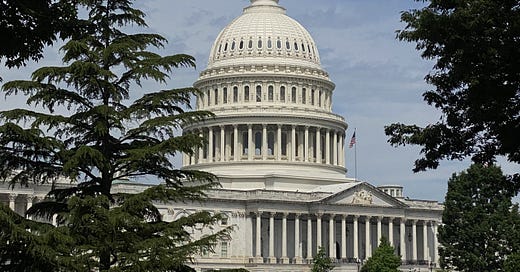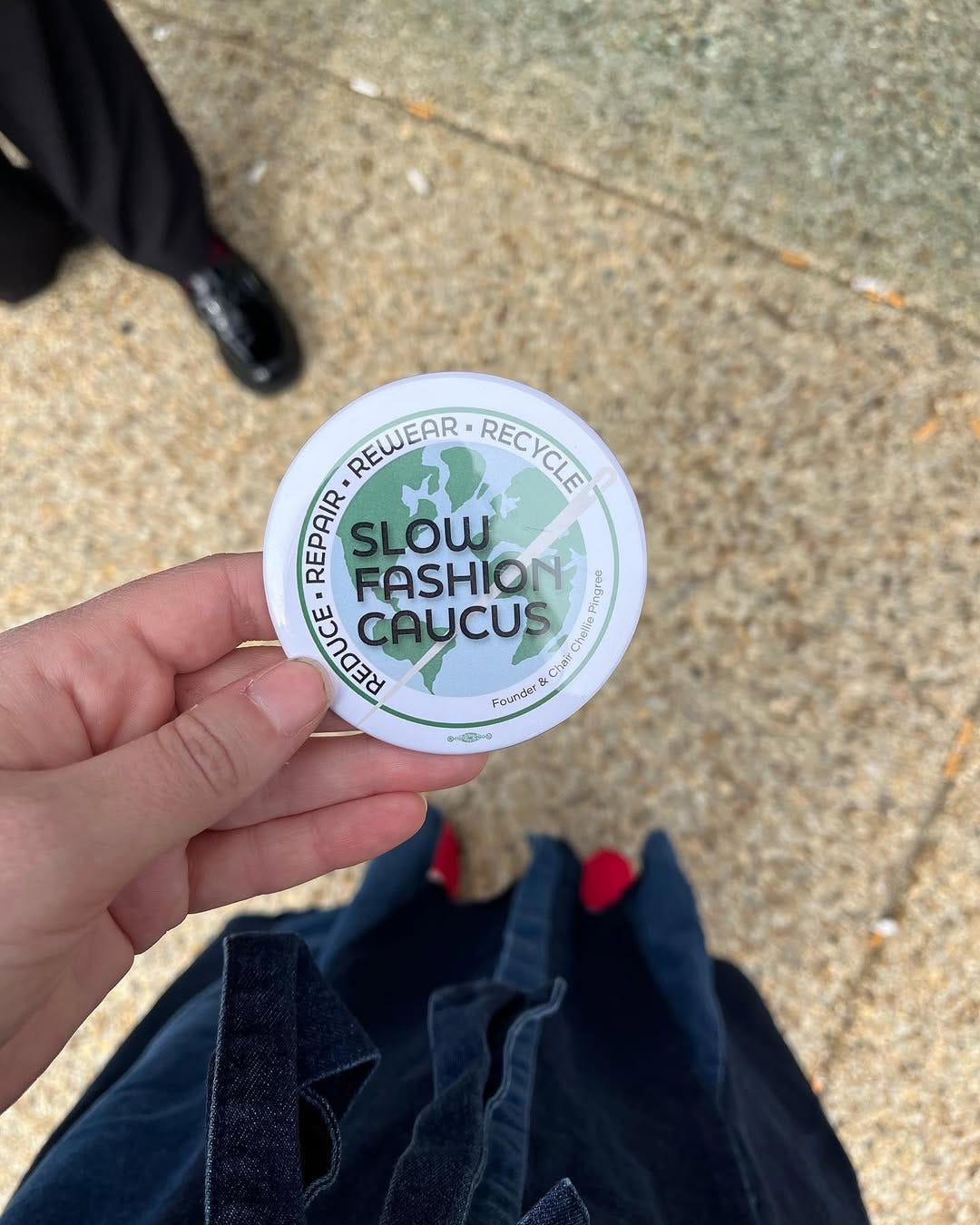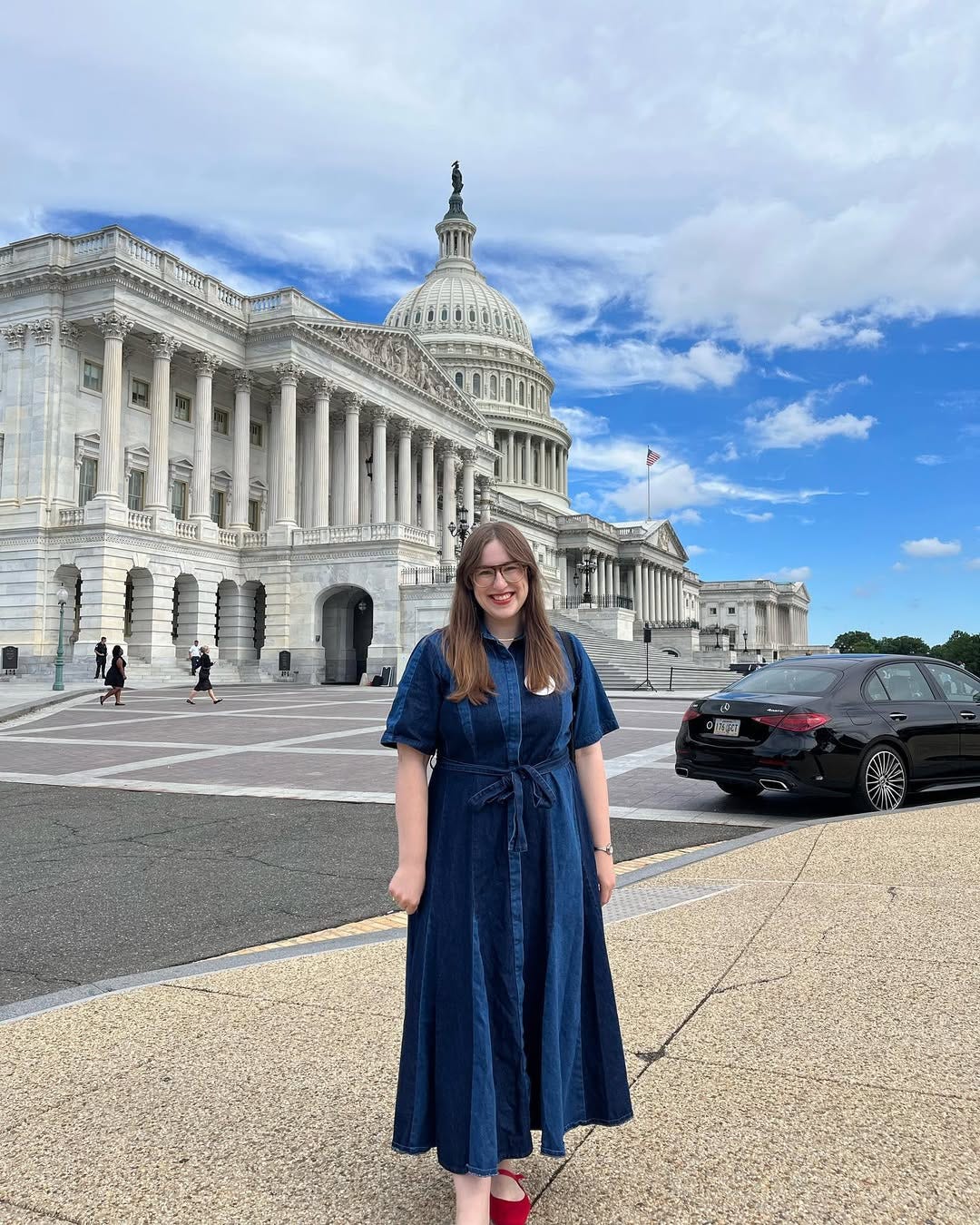Congress Gives Secondhand Fashion a Seat at the Table
New bipartisan caucus launched by Representatives Sydney Kamlager-Dove (D-CA) and Nicole Malliotakis (R-NY) to champion the growing resale economy
I’m Emily Stochl and this is Pre-Loved 🎤 indie media covering everything new and noteworthy in the world of secondhand fashion.
Please become a paid subscriber today. Your financial support keeps Pre-Loved independent and sustainable, and directly funds our one-of-a-kind reporting:
The secondhand economy finally has official recognition in Washington. Last week, Representatives Sydney Kamlager-Dove (D-CA) and Nicole Malliotakis (R-NY) launched the bipartisan Recommerce Caucus—a congressional coalition dedicated to “championing the buying and selling of pre-owned, refurbished, and secondhand goods.”
The timing reflects the resale sector’s explosive growth, with the total market for secondhand goods projected to reach $1.04 trillion by 2035. Indeed, in 2024, 58% of shoppers had purchased secondhand clothing —an all-time high— according to ThredUp's recent Resale Report.
“Recommerce is more than a trend,” explained Rep. Kamlager-Dove at the announcement launching the caucus, “it's a growing economic engine that provides consumers with affordable, high-quality goods and gives entrepreneurs, small businesses, and resellers access to trusted, thriving marketplaces.”
Yet despite explosive economic figures for the industry writ large, small sellers and vintage dealers report challenges. When Pre-Loved interviewed independent sellers for our 2025 Secondhand Sellers Income Survey, words like “challenging,” “struggling” and “underpaid” appeared repeatedly, as dealers voiced concerns ranging from tariffs to social media algorithms, and rising business costs to market saturation. Until now, these entrepreneurs have largely lacked representation in federal policy discussions that directly affect their businesses.
Congressional caucuses allow lawmakers to collaborate on issues, providing a platform to raise awareness, coordinate advocacy efforts, and build the constituent and industry relationships that are necessary to form future legislative action. This newest caucus builds on existing sustainable fashion efforts in Congress, including the Slow Fashion Caucus, spearheaded by Representative Chellie Pingree (D-ME), which launched last June to focus on textile waste, labor rights issues, and fashion's contribution to climate change.
For Kamlager-Dove — a founding member of both caucuses — this issue is deeply personal. Raised by a single mother with limited resources, her clothes primarily came from Goodwill growing up. “I learned the value — and the thrill! — of going to secondhand stores to find the goodies that I need,” she shared with Pre-Loved.
Today, she still shops and sells secondhand— reselling outfits she’s ready to rehome, and wearing vintage pieces to Congressional appearances. “I got a DM from a vintage seller recently who said, 'I saw you on C-SPAN and you were wearing our jacket!'" she laughed. After our call, the Congresswoman’s team texted a video of her outfit that day — a vintage 1980s Moschino suit with crossword print pattern and hot pink buttons.
These experiences with secondhand fashion likely resonate with a growing segment of the population who are both buying and selling resale. Increasingly, millions of Americans rely on secondhand markets to alleviate economic pressures— in fact, 58% of people who sell pre-loved clothes do so for extra income.
Chris Lamond, who represents the Coalition to Protect American Small Sellers (PASS Coalition), acts on behalf of a diverse range of entrepreneurs who might otherwise lack a voice in policy discussions. “Some [of the sellers] on our marketplaces are reselling products from their garage, or their closet, and others are small businesses that are doing large amounts of retail commerce through these marketplaces,” he explained.
Small resellers face a maze of overlooked policy challenges. Many operate in regulatory gray areas with unclear tax obligations and limited access to traditional small business resources.
Additionally, these entrepreneurs may have varied, complex, and often contradictory, feelings about how policies, such as tariffs, may be impacting their resale businesses — on one hand, tariffs driving up the costs of imported fast fashion may cause a shift toward secondhand shopping as an accessible alternative. On the other hand, the cost of doing business will simultaneously squeeze small businesses, with nearly every industry reporting that tariffs will “diminish profits and impact everything from expansion plans to hiring.”
Across sectors, 54% of businesses say they are planning to increase their prices to absorb the cost of new duties on imports, but secondhand sellers who are already working with slim margins will likely find hidden impacts such as imported packaging, shipping materials, and business supplies compound quickly.
“Even if you're a casual seller — if you don't have brick and mortar — where are you storing your inventory? And are those costs going to go up?” Kamlager-Dove asked. “Is it going to cost you more to get where you need to go for your inventory, or to mail it when you make a sale? Those are hidden costs that are never really discussed.”
The caucus plans to tackle these challenges through three main priorities: empowering small sellers and entrepreneurs, ensuring access to digital marketplaces, and promoting sustainable circular economy practices. Potential solutions include tax credits for solopreneur businesses to hire additional staff, reducing sales tax on secondhand items, subsidies for business start-up costs, and special incentives to encourage the growth of women-owned, veteran-owned, and minority-owned recommerce businesses.
Congresswoman Nicole Malliotakis (NY-11) is advocating for legislation to ease the tax reporting burden on casual sellers. Currently working through the House Ways and Means Committee, she aims to raise the IRS reporting threshold for online resellers from $600 to $20,000 (with a minimum of 200 transactions), which would eliminate excessive paperwork requirements for small-scale resellers.
Recognizing that online sales now account for 56% of secondhand apparel purchases, digital access represents a particularly significant priority. While major metropolitan areas have robust internet infrastructure, sellers in rural or other underserved areas may struggle with internet connectivity issues that limit their ability to participate in online marketplaces. The sector's growth requires removing such structural obstacles that would prevent broad participation across these communities.
This initiative has attracted significant industry support, with early endorsements from eBay, Depop, Etsy, Mercari, OfferUp, Pinterest, and Poshmark. “We believe recommerce is about more than transactions—it's about connection, sustainability, and unlocking economic opportunity,” wrote Jamie Iannone, President and CEO of eBay, in a statement to the press voicing their support.
Environmental considerations also drive the caucus's mission. According to eBay's 2024 Recommerce Report, 63% of global consumers say sustainability is important in their day-to-day purchase decisions. The environmental urgency becomes clear when examining fast fashion's scale of waste: the linear fashion industry produces over 100 billion new garments annually, creating massive textile waste streams that end up in landfills within months of production.
The recommerce sector offers a circular alternative that extends garment lifecycles and reduces demand for new production. As consumers increasingly recognize fashion's environmental impact, secondhand shopping represents both an economic necessity and an ecological imperative — making policy support for small recommerce businesses crucial for scaling alternative, more sustainable, consumption patterns.
"In 10 years, I would want this to be a multi-trillion dollar industry, and I would want us to have stalled fast fashion out — not just a 'drip-drip,' but for it to not even be in existence."
— Representative Sydney Kamlager-Dove

The Recommerce Caucus is just getting started, but momentum is building — already attracting bipartisan membership beyond its co-chairs, with Representatives Kevin Mullin (D-CA), Brittany Pettersen (D-CO), Hillary Scholten (D-MI), Barry Moore (R-AL), and Chris Pappas (D-NH) joining as founding members.
“This is an effort to shift the conversation to a more positive posture, to make sure members of Congress and staff understand the benefits of these marketplaces, and the work of small sellers in every district throughout the country,” said Lamond.
Next, the caucus will actively seek input from the secondhand selling community, including through virtual listening sessions designed to accommodate resellers nationwide. “What we need now are your ideas,” Rep. Kamlager-Dove emphasized. “Come to us and tell us the challenges that you're having so that we can be responsive.”
Kamlager-Dove's vision for the industry extends far beyond incremental policy changes. “In 10 years, I would want this to be a multi-trillion dollar industry,” she said, “and I would want us to have stalled fast fashion out — not just a “drip-drip,” but for it to not even be in existence.”
The secondhand economy has spent decades proving its value to buyers in the marketplace. Now, it finally has Congressional advocates working to prove its worth in the halls of power.
🗞 Read these next:
📥 Want to share your challenges and ideas with the Recommerce Caucus? Subscribe to Pre-Loved and stay up-to-date on all industry news, announcements, and opportunities for input.
Thanks for reading, and find me across the internet on Instagram, TikTok, and Threads! 💛 - Emily












